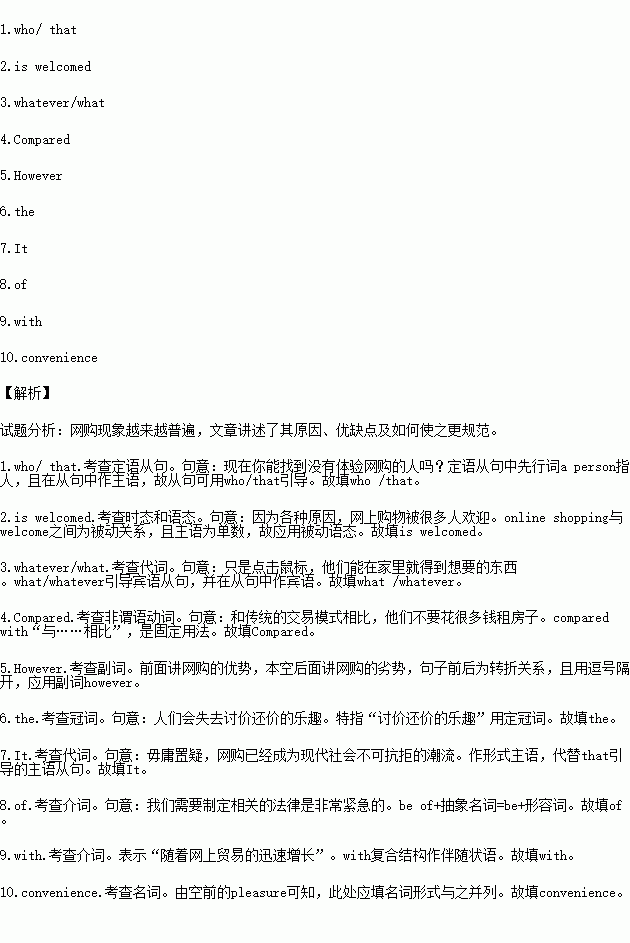题目内容
Online shopping is coming into fashion in most cities, where people are able to make full use of the rapidly-developed internet technology. Nowadays, can we find a person _1.___ hasn’t experienced online shopping? Definitely not.
Online shopping __2.__ (welcome) by most people due to various reasons. From the perspective of consumers, it can save some time for people who don’t have much spare time. Just click the mouse, they can get _3.__ they want while staying at home. For the retailers, it can cut some costs for those who don’t have enough circulating funds. __4.__ (compare) with the traditional trade mode, they don’t have to spend money in renting a house. _5._, there are still some disadvantages in online shopping. First, a face-to-face deal makes online shopping less reliable and trustworthy. Second, people will lose __6._ fun of bargain.
__7.__ is undeniable that shopping on the internet has become an irresistible trend in modern society. It’s _8.__ great urgency that we need to make the relative laws _9.__ the rapid growth of online shopping. Only in this way can we enjoy the pleasure and __10.__ (convenient) of online shopping without the concern of being cheated.
Age has its privileges in America, and one of the more prominent of them is the senior citizen discount. Anyone who has reached a certain age — in some cases as low as 55 — is automatically entitled to dazzling array of price reductions at nearly every level of commercial life. Eligibility is determined not by one’s need but by the date on one’s birth certificate. Practically unheard of a generation ago, the discounts have become a routine part of many businesses — as common as color televisions in motel rooms and free coffee on airliners.
People with gray hair often are given the discounts without even asking for them; yet, millions of Americans above age 60 are healthy and solvent(有支付能力的). Businesses that would never dare offer discounts to college students or anyone under 30 freely offer them to older Americans. The practice is acceptable because of the widespread belief that “elderly” and “needy” are synonymous (同义的). Perhaps that once was true, but today elderly Americans as a group have a lower poverty rate than the rest of the population. To be sure, there is economic diversity within the elderly, and many older Americans are poor. But most of them aren’t.
It is impossible to determine the impact of the discounts on individual companies. For many firms, they are a stimulus to revenue. But in other cases the discounts are given at the expense, directly or indirectly, of younger Americans. Moreover, they are a direct irritant in what some politicians and scholars see as a coming conflict between the generations.
Generational tensions are being fueled by continuing debate over Social Security benefits, which mostly involve a transfer of resources from the young to the old. Employment is another sore point. Buoyed (支持) by laws and court decisions, more and more older Americans are declining the retirement dinner in favor of staying on the job — thereby lessening employment and promotion opportunities for younger workers.
Far from a kind of charity they once were, senior citizen discounts have become a formidable economic privilege to a group with millions of members who don’t need them.
It no longer makes sense to treat the elderly as a single group whose economic needs deserve priority over those of others. Senior citizen discounts only enhance the myth that older people can’t take care of themselves and need special treatment; and they threaten the creation of a new myth, that the elderly are ungrateful and taking for themselves at the expense of children and other age groups. Senior citizen discounts are the essence of the very thing older Americans are fighting against — discrimination by age.
Outline | Details |
Introduction | Age determines whether an American can be given a discount, which is a common 1.________________in American business life today. |
Origin of senior citizen discount | ●Since the senior citizens are often treated as people who are in 2.____________, they are given such priority. |
3.__________ situation | ●The situation has changed a lot where the majority of the elderly are not poor at all. ●Younger Americans were at a/an 4.__________ directly or indirectly due to the discounts given to the elderly, thus leading to conflicts between generations. ●The number of older Americans 5.___________ to work rather than retire is on the increase, which means 6.__________ opportunities for young workers. ●It is no longer a kind of charity because millions of senior citizens don’t need the priority 7.__________. |
Conclusion | It’s unwise to offer discount priority to the elderly. ●It will mislead people to think they are unable to 8._____________ to themselves. ●People may think that they are ungrateful and they’re hurting the 9._____________ of other age groups. ●Actually senior citizen discounts, to some extent, 10. ___________against their age. |

